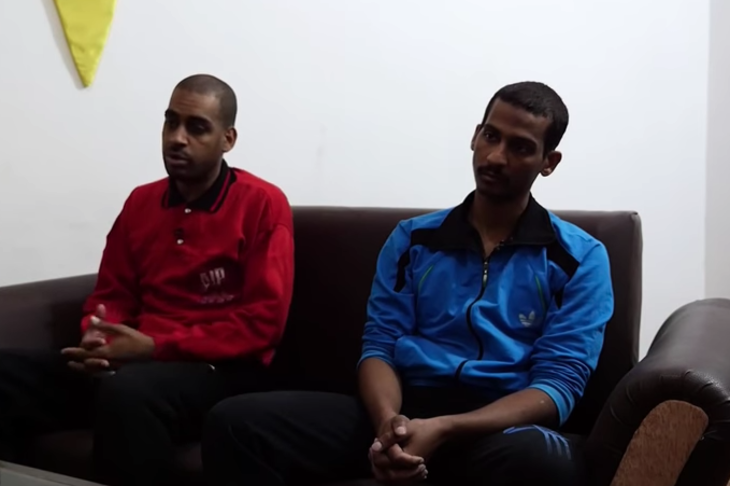Just getting to meet the two British jihadists accused of being part of the so-called “Beatles” cell of Islamic State terrorists is an arduous task. Crossing the Tigris in a battered river barge is the only route available from Iraq into Rojava, the Kurdish controlled part of northern Syria where the two men – Alexanda Kotey and El Shafee Elsheikh – are being held along with hundreds, possibly thousands, of Isis foreign fighters.
The Kurdish YPG militia oversee all movement in Rojava and its intelligence wing controls access to their detainees a seven hour drive away in the town of Kobane; a journey that takes visitors through dozens of towns battle scarred by coalition aerial bombardments and desperately fierce fighting that saw Isis, territorially at least, defeated. The “Beatles”, four British men led by Mohammed Emwazi or “Jihadi John”, as he became known, are accused of holding more than 20 western journalists and aid workers, beheading seven of them, and posting their murders on the internet.
Emwazi is dead, killed in an airstrike. Aine Davis, caught in Turkey, is in prison. The final two, Alexanda Kotey and El Shafee Elsheikh, are in Syria, captured trying to escape the battlefield in January.
I had wanted to confront these British men, who had killed friends and acquaintances, for years. This wasn’t to be a crusade. I just wanted to look in their eyes as I questioned them. I wanted to see if there was any remorse. I was set to be disappointed.
It was quite late when we pulled up outside a detention facility compound in Kobane. Armed YPG soldiers milled around a court yard while their commanding officer told me that the men would not be forced to speak to me. He pointed through the bars of a window towards Kotey and Elsheikh, praying on the floor of one of the building’s two rooms, cheerfully wishing me good luck in my efforts to persuade them to talk. He showed me inside and closed the door. An armed guard sat in the corner watching the three of us. Neither of the men was handcuffed.
Just a few months ago these men would have imprisoned me, as they had my friends. I would have likely appeared in videos dressed in an orange jump-suit, as had my friends. I may well have had my throat cut while being filmed, as they did to my friends. Yet I introduced myself and sat down in an armchair. It was a peculiar moment.
What struck me was their “Britishness”. They spoke with familiar west London accents in proper English not “Ali-G” style patois with occasional Arabic words thrown in; a common ridiculous affectation so favoured by other British-born jihadists I have followed across Syria and Europe. They listened as I explained that I wanted to discuss how they had found themselves incarcerated in Syria, and about their involvement with Islamic State.
Kotey was more talkative and insisted he would not be drawn on his involvement with the “Beatles”, which he dismissed as a media invention. He cited legal process as an excuse, despite the fact there is no legal process underway. It seemed ironic for a man to demand legal rights never afforded to any of the victims of those butchered by Isis. It also appeared to confirm that these men would refuse to talk. But they didn’t; they spoke for ninety minutes, attempting to justify their actions. Their conviction was disturbing.
They told me they joined Isis as it grew in strength amidst the chaotic fighting of the Syrian war which saw the creation of a bewildering number of jihadi groups. They believed, they said, they were duty bound to pay allegiance to Isis when the creation of the “Caliphate” was announced. They said it wasn’t the case that they has simply joined the nastiest, most bloodthirsty bunch on the block to advance their own warped sense of importance. Yet despite their involvement with Isis, they denied complicity with the torture and murder of thousands of people; the throwing off buildings of homosexuals; the imprisonment and enforced sexual slavery of women; the persecution of religious minorities. Instead, they did their best to pin the blame elsewhere: on Britain. They argued that their allegiance to this dreadful regime should be equated to every British person who supports its government and the actions of its military in their name. How did executing people in public and leaving their bodies to rot on railings in a Raqqa park equate with supporting Parliament in Britain? They were clear: there was no difference.
And what did they have to say to the families of innocent aid workers murdered by the “Beatles” in Syria, or the families of those killed in terror attacks in Manchester, London, Paris or Brussels? Nothing, except to warn, terrifyingly, that there would be more Isis-inspired attacks in Europe, regardless of the group’s current fractured condition. My encounter with these men made one thing clear: they were utterly without remorse. Worse, maybe, I think they believe everything Islamic State has done was justified and still do. Their arguments, refusals and denials of guilt aren’t credible; but they were intelligent, eloquent and focused on their position. One day, these men will likely appear in court. Convicting them may prove more difficult and complicated than perhaps many will expect. But I left that room knowing that they and many others like them remain a dangerous threat to all society. Islamic State may be beaten. But it hasn’t gone away. Stuart Ramsay is Sky News’ Chief Correspondent. He interviewed Alexanda Kotey and El Shafee Elsheikh in Syria, earlier this month





Comments